By Paula Schlueter Ross
SELMA, Ala. — “Crossing Over” — from bondage to freedom, from sin to salvation, from death to everlasting life — was the theme as some 1,000 peopl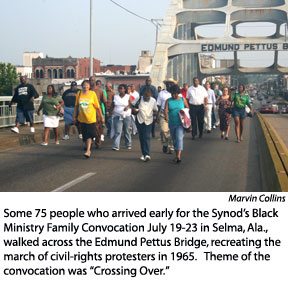 e gathered for the 19th Black Ministry Family Convocation, held here July 19-23.
e gathered for the 19th Black Ministry Family Convocation, held here July 19-23.
In an emotional illustration of that theme, some 75 convocation attendees marched across the historic Edmund Pettus Bridge — just as civil-rights protesters had done in 1965 — to celebrate and honor the determination of those early Black leaders.
The march was the “fulfillment of a dream” for Dr. Phillip Campbell, executive director of the Synod’s Board for Black Ministry Services, which sponsored the convocation. Campbell described it as “very emotional.”
“I had heard so much about it when I was in school … and here I am, actually in this [historic] place,” he said.
“After the walk, there was a policeman standing there — a great big guy — and I walked up and shook his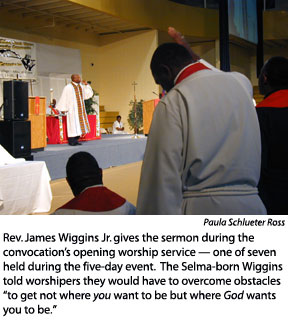 hand,” Campbell said. “And I thought [in 1965] police beat up on the marchers. And this time we were shaking hands, so I thought that was rather symbolic.”
hand,” Campbell said. “And I thought [in 1965] police beat up on the marchers. And this time we were shaking hands, so I thought that was rather symbolic.”
The convocation, held every two years, brings together Lutherans involved in Black ministry Synodwide for worship, business sessions, sharing, training, and fellowship.
Worship — including rousing performances by Black-ministry choirs and soloists — is a regular part of every convocation, according to Campbell, and this year’s gathering featured a total of seven worship services.
“Worship services are always a highlight,” Campbell said. “And we have some great preachers, outstanding preachers, and I just love it. It gives us a chance to showcase some of our best preachers.”
Preaching at the convocation’s opening worship service, Rev. James Wiggins Jr. told participants “it’s time to cross over from human failures to divine possibilities.”
The Selma-born Wiggins told worshipers they would have to overcome obstacles “to get not where you want to be but where God wants you to be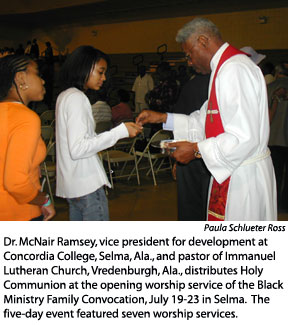 ,” and that “God will do some amazing things through you.”
,” and that “God will do some amazing things through you.”
Just as God helped the Israelites by dividing the Jordan River so that they could cross into the “promised land,” God “will do it for you, too,” Wiggins said.
Rev. John Loum, who serves African immigrants in the Synod’s Indiana District, told the convocation that Africans “want to be partners” with African Americans, and he proposed that the two groups work together in leadership training, youth ministry, and church planting.
Loum said many African immigrants are joining U.S. Muslim groups. “We need to bring them back,” Loum said. “We need to be intentional about reaching them for Jesus Christ.”
In her keynote address on leadership, Dr. Cheryl Williams described a leader as “someone who has influenced” others. An effective leader has followers, and treats each of them as an individual, Williams said.
“Trust is the foundation 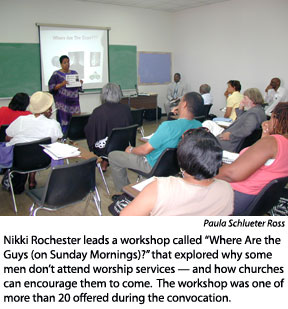 of leadership,” she said, and leaders must consider trust as their “most precious” asset — if others don’t trust you, they will not follow, she said
of leadership,” she said, and leaders must consider trust as their “most precious” asset — if others don’t trust you, they will not follow, she said
Williams, associate professor in the School of Business and assistant to the president at Concordia University, Irvine, Calif., encouraged attendees to “be ready” to step forward as leaders. A phone call got Rev. Martin Luther King Jr. involved in civil rights, she said, and Rosa Parks was “ready” when she refused to give up her bus seat, launching the civil-rights movement that eventually changed U.S. history.
Effective leaders also have “vision,” Williams said, to be able to see things in new and creative ways.
She urged African Americans to become self-sufficient, create a “sense of community and trust” among themselves, strengthen family relationships, and safeguard their health.
During business sessions, delegates adopted six resolutions, all unanimously, voting to:
- encourage Black-ministry congregations to “embrace” the Synod’s Ablaze! initiative by becoming more active in reaching people for Christ, finding new ways to “revitalize” existing congregations for outreach, and making use of available resources and training.
- encourage financial support for Phase 1 of the “Vision Plan” of the Board for Black Ministry Services, which asks each member of LCMS Black-ministry congregations — some 70,000 men, women, and children — to contribute $5 a year for three years. The total offerings of more than $1 million would be used for Black-ministry outreach efforts.
Campbell told Reporter that Black Lutherans are embracing the idea because “everybody can participate, and it’s not beyond the reach
 of even Sunday-school kids and people on fixed incomes.” He said he is optimistic the goal will be reached.
of even Sunday-school kids and people on fixed incomes.” He said he is optimistic the goal will be reached. - encourage the Synod’s Ethnic Immigrant Institute of Theology — an “alternate route” for training immigrants for pastoral ministry — to accept African American students. The action was taken in light of “difficulties” the LCMS has had in “raising leaders and planting churches in [largely urban] African-American communities,” according to the resolution passed by delegates.
- designate $6,775.88 in convocation offerings — contributed during worship services — for Black Lutheran higher education through Concordia College, Selma, the nation’s only historically Black Lutheran college and host of the convocation.
- ask the Board for Black Ministry Services to consider Washington, D.C., as the site of the next Black Ministry Family Convocation in 2008.
In his report from the Board for Black Ministry Services, Campbell shared goals for “Lifting the Vision, Today and Beyond”:
- planting congregations to reach a new generation of African Americans. Campbell urged each congregation to start at least one new outreach ministry in the next year.
- re-energizing the 300-plus existing LCMS Black-ministry congregations for outreach.
- recruiting more pastors and other professional church workers for Black ministry. Fewer than 100 Black pastors currently serve<IMG class=pad alt="convo kids praying" src="../graphics/assets/im

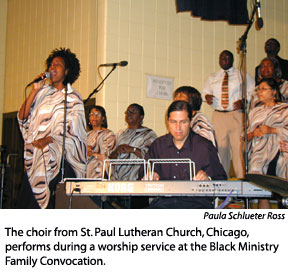 of even Sunday-school kids and people on fixed incomes.” He said he is optimistic the goal will be reached.
of even Sunday-school kids and people on fixed incomes.” He said he is optimistic the goal will be reached.

